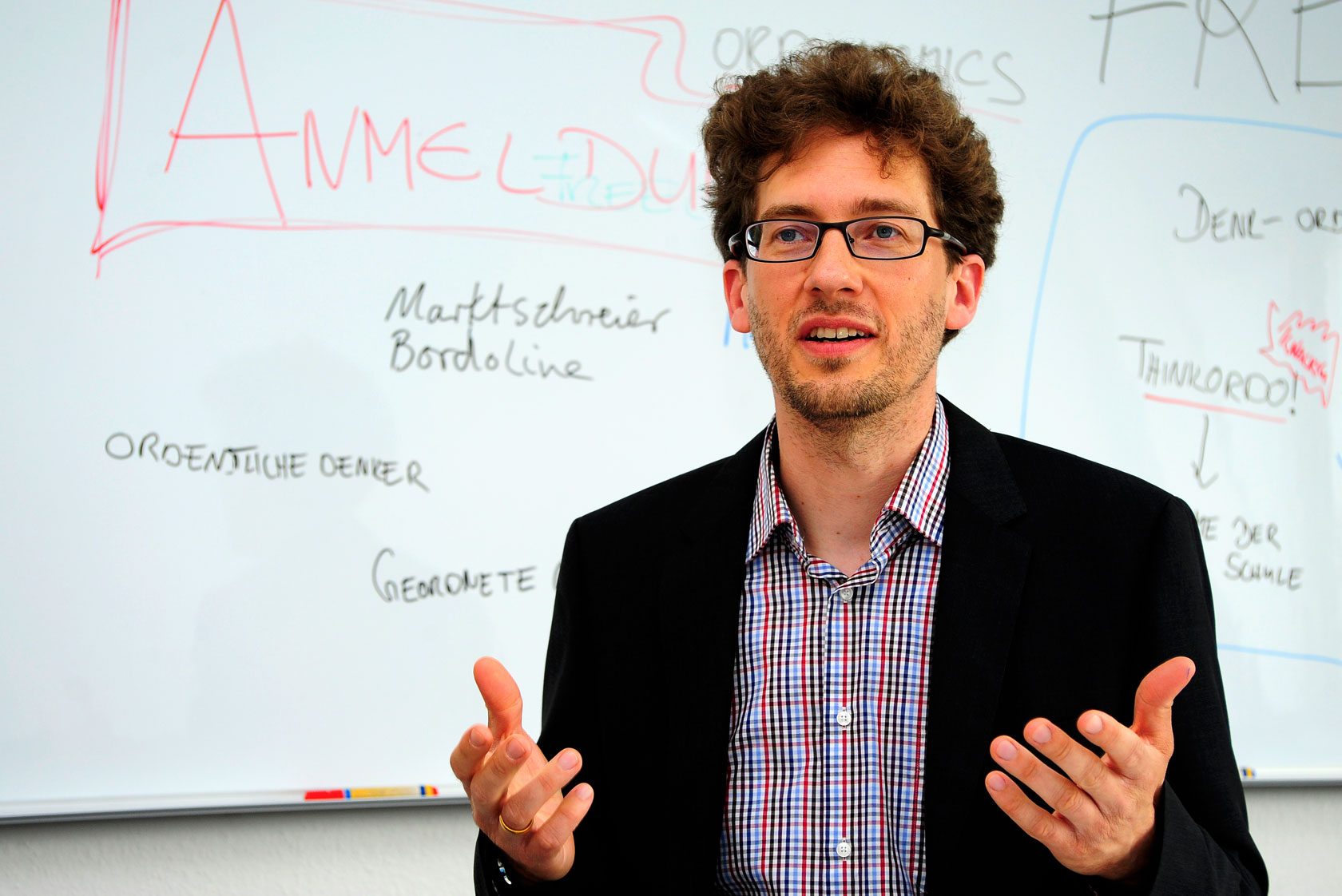
Practicing Open Science with Students: How Does Blogging Work as a Teaching Concept?
A teaching course which also works like an editorial meeting, students who blog on academic topics for grades; Professor Tim Krieger has been practicing this successfully for several years and for his efforts, he has already received two teaching awards. In this interview, he explains his “Economics Blog” teaching concept and reports on the opportunities and experiences of blogging as part of teaching.
Since 2013, economist Professor Tim Krieger, holder of the Wilfried Guth Endowed Chair for Constitutional Political Economy and competition Policy at Albert Ludwigs University Freiburg, has been running the Think Ordo! – Rethinking Regulatory Policy (link in German) blog as part of his Economics Blog course (link in German). For his teaching concept, Professor Krieger has already received two teaching awards, most recently the University Teaching Prize 2017 (link in German) from Albert Ludwigs Universität Freiburg.

Professor Krieger, how did you get the idea of a course of study which involves blogging?
Originally, I myself wanted to run a blog on regulatory issues using my own writing, because I have always enjoyed writing to express my opinion. As a then-newly appointed professor in Freiburg, I soon noticed that I had too many responsibilities with the development of my teaching plans to be able to regularly fill a blog with content. This gave me the idea of developing a course in which the students write the texts.
What is the purpose of the blog? Who is the target group?
The regulatory policy in the tradition of the Freiburg School has given us a specific content profile – something that no other business school in Germany can boast. The aim of the blog is to reinterpret the ideas of the Freiburg School and to make them a part of the public debate. Our target group is all citizens interested in economic policy. Consequently, all texts need to be written so they are at least understandable to the “educated layman”, that is a person who understands a few things about economy, but not necessarily the actual topic of the post.
What tasks do the students have to fulfil?
The course is open to Bachelor, Master and teacher-training students, all of whom have different performance requirements according to their examination regulations. Basically, one blog contribution of 500 words is to be written per 2 ECTS points. In addition, there are “editorial meetings”, in which each student is expected to take part in active discussion of the other students’ texts. That may sound like a manageable amount of work, but it is rather more demanding than that, because each text needs to have well-researched content, written in an appealing form. And in the final stage it needs to undergo several rounds of revision of both language and content.
How are the course and the collaborative work on the blog organised?
The participants in the course have a dual role as authors and editors. Each participant presents at least one self-written blog contribution during the course, and must defend it to the rest of the group. These discussions in our editorial meetings are mostly very fruitful and supply ideas for additional – sometimes even better – arguments and text structures. Although I am in charge of the course, I myself only act as a member of the editorial staff, contributing my ideas like everyone else.
After the discussion, the author has to rework the post and send it back to the group. This is the point at which my actual work usually starts; where I re-read the contributions very carefully, checking whether the line of argumentation and above all the contents are correct. It often takes several rounds before the post is ready and the final approval of all participants has been obtained.
To what degree are students trained for blogging?
Technical and legal questions are briefly discussed at the beginning of the seminar. That is mainly a task for my chair. This is mainly down to the fact that our goal is not necessarily to turn participants into “bloggers” running their own blogs, but to teach them certain skills that can be learned through blogging. Above all, this involves the ability to write interesting, pointed and meaningful texts for a particular target audience. What makes good blogging a real challenge for students is the fact that they usually learn different ways of writing in our seminars: it should be academic, broad, and deliberative. Of course I can teach “good” writing itself only to a limited extent, since I myself have no journalistic background. Therefore, I regularly invite journalists to the class; the economic editors of the Badische Zeitung are often invited to our classroom.
What are the advantages of blogging for communicating academic ideas?
Let me answer this question, which is rather generally related to blogging in academia, more specifically with regard to my course and the Think Ordo! blog. Within this very narrow concept, I do not make any high claims regarding teaching and communicating academic ideas. This could not and should not be done within a single course. What one has to keep in mind for university teaching in the age of the mass university is that, whatever the specialist academic detail is, it is career-orientated matters which are decisive.
With Economics Blog, the central skill that I want to give students for their future professional life is the ability to break down complex issues and prepare them for certain target groups in an accessible way. In addition, they should learn to weigh up theories and empirical evidence, to arrive at an opinion, and then to convey this opinion. These are abilities that are indispensable in ministries, associations and research institutes. Rather regrettably, however, they are seldom part of business studies courses.
What differences do you see in comparison to other courses?
Above all, the detailed discussion in our “editorial meeting” and close contact when editing the texts are special features in this course of mine. This is very good for the participants, although it is an effect that is achieved independently from blogging. In addition, blogging has the advantage that the participants are compelled to think through their arguments until they are complete. There is no longer any mental “muddling through” or “hiding”. An opinion must be argued for and, if necessary, defended. The learning effect resulting from this is enormous. This effect can hardly be achieved in larger lectures.
What feedback do you get for the course?
In general, the course and the blog are received very positively by the students. The course gets consistently very good responses during teaching evaluations. This is certainly due to the fact that we discuss genuinely contentious topics that are very important to the participants. The fact that you later actually see your post online and get feedback from friends and family is for many a great feeling.
I have also received a lot of positive feedback from my colleagues in Freiburg and other universities, with a great deal of interest shown in how such a blog is running. I am happy to help in word and deed, but so far no one has yet taken up the reins and established another student economics blog.
Do you think that blogging will continue to be part of university courses?
Although I have witnessed a great interest from my colleagues, I think that at least for economics, itis unlikely. The reason is that the effort required is very high, if you want to operate the blog seriously and be reasonably successful. Although the course is done in small groups, it is by far the most labour-intensive course I run.
What barriers do you see in blogging?
Blogging, as we do it, is complex for all involved. This results in a resource problem, since it is not possible to ensure that each student of every year group of students can have access to a course of this kind. In addition, good blogging requires certain journalistic skills and interests, which not everyone brings to the table – and this is true of teaching staff and students alike. And ultimately, blogs are only worthwhile when they are actually read.
Would you give us examples of particularly successful blog posts?
Our most-clicked post has the nice title “Super Mario vs. Bitcoin: Knock-out für die EZB?” and has already been read more than 5,000 times. Another example is “Ordoliberalism, as seen by Southern Europe: Authoritarian and Anti-Democratic”. This post won our essay competition.
What is the link between the blog and the Think Ordo! essay contest?
Our essay contests are used to focus on specific topics and open the blog to other potential authors within the University of Freiburg. To this end, we look for topics that we believe are sufficiently current and contentious to launch a fiery debate. All Freiburg students are invited to participate, the three winning contributions – along with other successful contributions not among the top three – being showcased in the blog.
What is your personal open science practice?
My initial motivation to study economics was my interest in economic policy. Even when the time restrictions of my job do not always allow it, I try to take part in economic policy debates. Blogging is an important part of that. For several years now, I have been a regular author on the Economic Freedom – The Regulatory Journal blog (link in German), run by Norbert Berthold from Würzburg. And I also sometimes write for other blogs like Economists’ Voice (link in German). You can find an overview of my posts on my professorship website
The Economics Blog course was awarded this year’s university teaching prize by the University of Freiburg. With the prize money, we now have resources to continue developing our blog. We would like to work more with graphics, animations and maybe also videos, which we want to include in the posts. In this way, we can include more content in the posts, adding a visual component that facilitates access for the viewer and allows us to become more active on social media.
Photographer: Thomas Kunz
View Comments

Open Data: How Does Personality Affect how Research Data is Shared?
Researchers who consider whether or not to share research data are often confronted...



